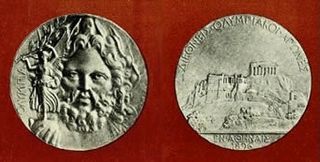Lists of Youth Olympic medalists:
- Summer
- List of 2010 Summer Youth Olympics medal winners
- List of 2014 Summer Youth Olympics medal winners
- List of 2018 Summer Youth Olympics medal winners
- Winter
Lists of Youth Olympic medalists:

The modern Olympic Games or Olympics are the leading international sporting events featuring summer and winter sports competitions in which thousands of athletes from around the world participate in a variety of competitions. The Olympic Games are considered the world's foremost sports competition with more than 200 teams, representing sovereign states and territories participating; by default the Games generally substitute for any World Championships the year in which they take place. The Olympic Games are held every four years; since 1994, they have been alternated between the Summer and Winter Olympics every two years during the four-year period.

The 1924 Winter Olympics, officially known as the I Olympic Winter Games and commonly known as Chamonix 1924, were a winter multi-sport event which was held in 1924 in Chamonix, France. Originally held in association with the 1924 Summer Olympics, the sports competitions were held at the foot of Mont Blanc in Chamonix, and Haute-Savoie, France between 25 January and 5 February 1924. The Games were organized by the French Olympic Committee, and were originally reckoned as the "International Winter Sports Week." With the success of the event, it was retroactively designated by the International Olympic Committee (IOC) as "the first Olympic Winter Games".

The 1924 Summer Olympics, officially the Games of the VIII Olympiad and also known as Paris 1924, were an international multi-sport event held in Paris, France. The opening ceremony was held on 5 July, but some competitions had already started on 4 May. The Games were the second to be hosted by Paris, making it the first city to host the Olympics twice.

An Olympic medal is awarded to successful competitors at one of the Olympic Games. There are three classes of medal to be won: gold, silver, and bronze, awarded to first, second, and third place, respectively. The granting of awards is laid out in detail in the Olympic protocols.

A gold medal is a medal awarded for highest achievement in a non-military field. Its name derives from the use of at least a fraction of gold in form of plating or alloying in its manufacture.

The International Olympic Committee (IOC) uses icons, flags, and symbols to elevate the Olympic Games. These symbols include those commonly used during Olympic competition—such as the flame, fanfare and theme—as well as those used throughout the years, such as the Olympic flag.

The all-time medal table for all Olympic Games from 1896 to 2022, including Summer Olympic Games, Winter Olympic Games, and a combined total of both, is tabulated below. These Olympic medal counts do not include the 1906 Intercalated Games which are no longer recognized by the International Olympic Committee (IOC) as official Games. The IOC itself does not publish all-time tables, and publishes unofficial tables only per single Games. This table was thus compiled by adding up single entries from the IOC database.

Argentina participated at the Olympic Games for the first time in 1900. It has participated at all subsequent Summer Olympics except in 1904, 1912, and the nation boycotted the Moscow Olympics due to its support for the United States in 1980. It participated at the Winter Olympics in 1928, 1948, 1952 and continuously since 1960.

Luge is a winter sport featured at the Winter Olympic Games where a competitor or two-person team rides a flat sled while lying supine and feet first. The sport is usually contested on a specially designed ice track that allows gravity to increase the sled's speed. The winner normally completes the route with the fastest overall time. It was first contested at the 1964 Winter Olympics, with both men's and women's events and a doubles event. Doubles is technically considered an open event since 1994, but only men have competed in it. German lugers have dominated the competition, winning 87 medals of 153 possible.

Brazil first participated at the Olympic Games in 1920, after missing the previous five Summer editions. The country has sent athletes to compete in every Summer Olympic Games since then, except for the 1928 Games. As of 2020, Brazilian athletes have won a total of 150 medals in 18 different Summer sports.

The Philippines has competed in every edition of the Summer Olympic Games since its debut in the 1924 edition, except when they participated in the American-led boycott of the 1980 Summer Olympics. Filipino athletes have also competed at the Winter Olympic Games on five occasions since 1972.

The Czech Republic first participated at the Olympic Games as an independent nation in 1994, and has competed in every Summer Olympic Games and Winter Olympic Games since then. Prior to the dissolution of Czechoslovakia in 1993, Czech athletes had competed at the Olympics from 1920 to 1992 as Czechoslovakia and from 1900 to 1912 as Bohemia.

The National Olympic Committee of Ukraine is a non-profit all-Ukrainian public organization responsible for development, reinforcement, and protection of the Olympic movement. The committee has an exclusive right to represent Ukraine in the Olympic Games and other competitions of the International Olympic Committee. In November 2022, Vadym Gutzeit was elected the new President of the National Olympic Committee of Ukraine.

Morocco first participated at the Olympic Games in 1960, and has sent athletes to compete in every Summer Olympic Games since then, except when they participated in the American-led boycott of the 1980 Summer Olympics. Morocco also boycotted the 1976 Games, withdrawing after having initially sent a delegation. In doing so, Morocco joined the boycott of the Games by most African countries, in protest against New Zealand's participation following an All Blacks rugby match, unrelated to the Olympics, against an apartheid team from South Africa. Only one Moroccan representative had time to compete before his country's withdrawal: Abderahim Najim took part in the Men's Light Flyweight event in boxing, and lost his first and only match.

Sri Lanka first participated at the Olympic Games in 1948, and has sent a delegation to every Summer Olympic Games except for the `1976 Games and has never participated in the Winter Olympic Games.

The 2014 Summer Youth Olympics, officially known as the II Summer Youth Olympic Games Chinese: 第二届夏季青年奧林匹克运动会; pinyin: Dì'èrjiè Xiàjì Qīngnián Àolínpǐkè Yùndònghuì, and commonly known as Nanjing 2014, were the second Summer Youth Olympic Games, an international sports, education and cultural festival for teenagers, held from 16 to 28 August 2014 in Nanjing, China. These were the first Youth Olympic Games held in China, making it the first country to host both regular and Youth Olympics following the 2008 Summer Olympics in Beijing.
The Olympic medal table is a method of sorting the medal placements of countries in the modern-day Olympics and Paralympics. The International Olympic Committee (IOC) does not officially recognize a ranking of participating countries at the Olympic Games. Nevertheless, the IOC does publish medal tallies for information purposes, showing the total number of Olympic medals earned by athletes representing each country's respective National Olympic Committee. The convention used by the IOC is to sort by the number of gold medals the athletes from a country have earned. In the event of a tie in the number of gold medals, the number of silver medals is taken into consideration, and then the number of bronze medals. If two countries have an equal number of gold, silver, and bronze medals, they are ordered in the table alphabetically by their IOC country code.

The United States of America has sent athletes to every celebration of the Youth Olympic Games. The United States Olympic Committee (USOC) is the National Olympic Committee for the United States.